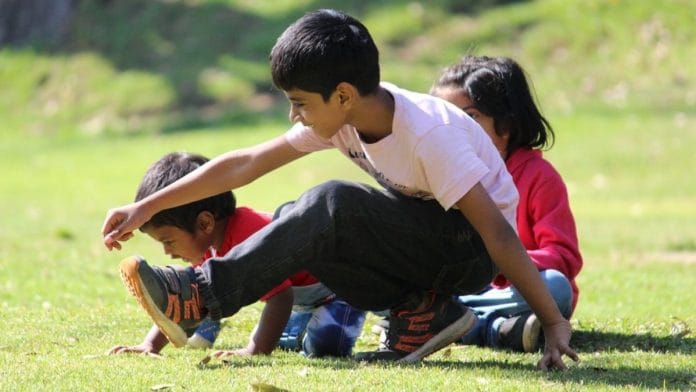Making outdoor play areas greener and more biodiverse could improve children’s immune systems in one month, a new study suggests.
Scientists in Finland covered the playgrounds of city preschools with forest undergrowth, lawn turf and planter boxes.
After 28 days, the experimental study found the children (aged three to five) in the modified playgrounds appeared to have a greater diversity of microbes on their skin and in their guts than those children in playgrounds surfaced with paving, tiles and gravel. It says this could improve the regulation of their immune systems.
Although the Finnish experiment was small – involving only 75 children at 10 venues – Aki Sinkkonen, research scientist at the Natural Resources Institute Finland, who led the work, says the results are strong and that further studies are now underway.
“The yard areas of all daycare centres should be transformed into green areas,” Sinkkonen says, “because this will improve the regulation of children’s immune systems in only a month.”
Also read: ICMR data shows BCG vaccine raises immune response in elderly, could protect against Covid
The ‘biodiversity hypothesis’
When we are in contact with nature, we expose ourselves to a broad range of microbes, activating different parts of our defensive system, the study explains. Reduced contact with natural environments and biodiversity, however, may adversely affect the immune system – this is known as the ‘biodiversity hypothesis’.
The Finnish researchers say their findings support the idea that low biodiversity in modern living environments could lead to “uneducated” immune systems and an increased prevalence of immune-mediated diseases.
Previous studies have found that children who live in rural areas and who are in contact with nature have a lower probability of catching an illness resulting from disorders in the immune system, says Sinkkonen.
The number of autoimmune diseases – where the immune system attacks the body – is on the rise in developed nations. The conditions include type 1 diabetes, multiple sclerosis, rheumatoid arthritis, lupus and coeliac disease.
While the underlying cause of autoimmune disease is still unknown, the most common theory, according to Harvard Medical School, is that a particular genetic background makes certain people prone to immune-system “misfiring”. So when they encounter an environmental trigger – such as an infection or toxin – this sets off autoimmune disease.
The health benefits of being in nature have long been promoted around the world. For example, “forest bathing” – essentially, being in the presence of trees – has been part of the public health programme in Japan since the 1980s.
Spending at least 120 minutes a week in nature is associated with good health and well-being, according to research led by the European Centre for Environment and Human Health in the UK.
Writing in the journal Nature, the report’s authors say: “A growing body of epidemiological evidence indicates that greater exposure to, or ‘contact with’, natural environments (such as parks, woodlands and beaches) is associated with better health and wellbeing, at least among populations in high income, largely urbanized, societies.”
Writing in the journal Nature, the report’s authors say “a growing body of epidemiological evidence” suggests greater exposure to places such as parks, woodlands and beaches increases health and well-being – “at least among populations in high income, largely urbanized, societies”.
In adults, living in greener urban areas is associated with lower probabilities of cardiovascular disease, obesity, diabetes, asthma hospitalization, mental distress and, ultimately, mortality, the report says. In children, the associated outcomes are lower risks of obesity and myopia (short-sightedness).
This article was first published in the World Economic Forum
Also read: India’s low hygiene gives it more immunity against virus, helps in Covid fight — CSIR study






